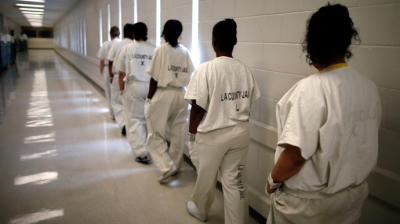Even years of toxic relationships didn't prepare female prisoners for this

Incarcerated women that I know and love are silently watching as bus loads of transfers from men’s prisons, adorned in “women’s rights” they’ve never seen or experienced in prison, filter in to overtake their environment.
When the male inmates see each other in passing they ominously say, “stick to the plan.” No one knows what that means, and everyone is too afraid to ask. This is psychological warfare. Even with years invested in toxic relationships, none of the incarcerated women I know could ever be prepared to shoulder this burden.
Anyone who transferred into women’s correctional facilities by way of SB 132 — California’s law that permits men to transfer into women’s prisons by merely claiming to be women under the banner of having a “gender identity” other than their sex — can request bed moves whenever and to wherever they want. They can choose their bunkmate or choose to live alone.
When women arrive at the prison reception center, they are stripped down naked in a holding tank with several other women, while officers inspect every inch of your body, which is now property of the state.
They are given a lock, a cup, and a spoon. They are told to carry themselves in a confident manner and to not let the emotions of fear or anxiety be obvious to others. Shortly thereafter, they are given a number that replaces the last identifier they had — their name.
But this grim look into the receiving process is neither the worst nor darkest part of incarceration for any woman. It is loneliness. It is a loneliness so deep and profound, and it’s exacerbated even further by the new law that allows men into their quarters, attaching itself to these women in savage fashion ever since the state’s implementation of this legislation in January 2021.
Thus far, the state review board cannot deny any request based on one’s physical anatomy, criminal history, or sexual orientation. Contrary to what many might assume, these male prisoners are not required to have taken cross-sex hormones nor is it a requirement that they undergo a cosmetic surgery to remove their genitals. This is, in my view, the most hateful step backwards in women’s rights in our lifetime.
The Central California Women’s Facility, which is the world’s largest women’s prison, has 8-person cells. A male transfer can request single-cell status and displace seven women on a whim. They can change job assignments. They can strangle women and their consequence is to be moved to another prison yard.
The need to feel connected is profoundly human. When life choices lead you to prison, one of the harshest realities you learn to live with is the incredible disconnect. Indeed, the women’s loneliness is so heavy I can feel it through the phone when I speak to them.
Most of these women are too afraid of retaliation or losing their parole dates to write inmate complaints or report incidents because they’ve watched their peers lose everything in their attempts to stand up for their limited rights. The lawsuit that was filed against the state department of corrections by the Women’s Liberation Front on behalf of four incarcerated women on grounds that forcing them to live with males in prison is cruel and unusual punishment under the Constitution remains stagnant.
These forgotten women have written to state assembly members, state senators, federal lawmakers, celebrities and newspapers. There has been little to no interest from anyone. They are constantly overlooked.
The depths of depravity and darkness are still a mystery to me as many of the women I communicate with do not feel safe talking about what is happening over the phone, because their calls are monitored. They have been abandoned by legislators and are used as fuel for the flames of the gender ideology fire.
Predators' needs and wants are prioritized over everything. The lifetime of conditioning and the actions of the institution, the state and the public show them that they are alone.
They are alone together, but they are very alone and that is not the way it’s supposed to be. We are called to remember the least of these, to remember those of us that are in prison as if we are with them in prison.
Amie Ichikawa is a former inmate and founder of the charity group Woman II Woman, a nonprofit organization that advocates for the rights of incarcerated women. She became aware of the need for female-centered re-entry support and services after being released from prison and decided to act as a resource center for her sisters who were still inside the correctional facilities. Woman II Woman stands as one of the only platforms for the incarcerated female population in California’s prison system to which they have unprejudiced access.




























